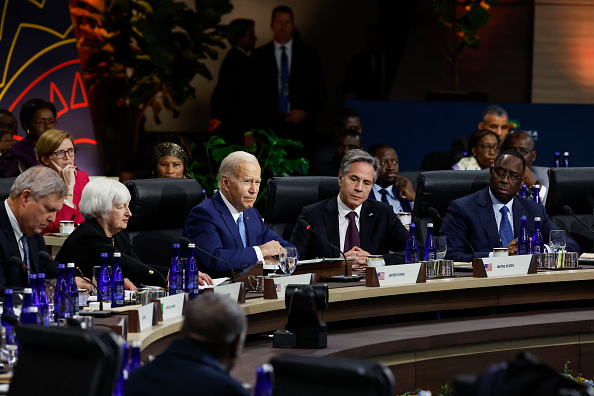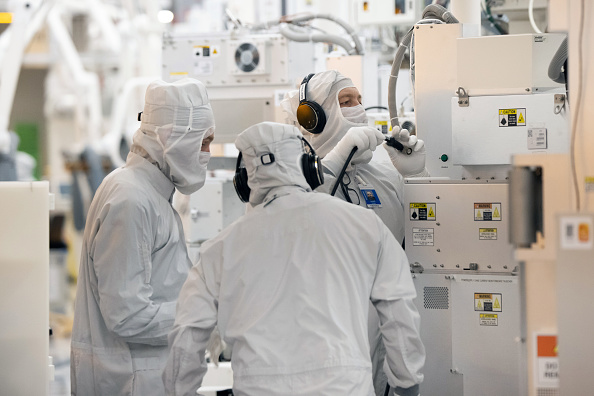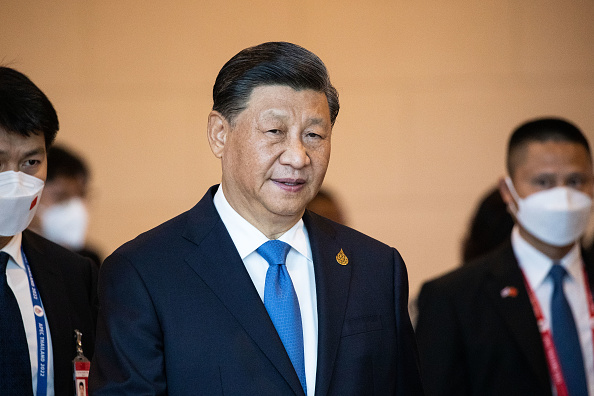
 All in On Africa
All in On AfricaThe Biden administration hosted nearly 50 African leaders and delegates this week at a summit designed to reset and improve U.S. ties with African countries. The administration made an explicit pitch to court African nations on the economic benefits of tighter ties to the West, with a more nuanced argument that the U.S. offers a better option to African partners than China.
As the U.S. recalibrates its foreign policy with a keener focus on China, Africa is of great strategic importance to the Biden administration, which sees China as America's most significant economic and military competitor.
The African leaders summit was thus designed as an implicit yet ambitious challenge to China's economic and diplomatic primacy on the continent. In recent years, China has become the number one trading partner of sub-Saharan African countries with Africa importing everything from textiles to smartphones, while China buys African agricultural products and commodities. In the last few decades, Beijing has also given billions towards infrastructure and foreign aid across Africa.
Chinese foreign ministers have also made Africa their first foreign destination of each new calendar year since 1991 whereas Biden has yet to visit.
"The United States is all in on Africa's future," Biden said in his speech. China-Africa relations are "the bedrock of China's foreign policy," the Chinese ambassador to the U.S., Qin Gang countered in his.
The increasing leverage that Beijing has in Africa is a major concern for the Biden administration, particularly amid Russia's invasion of Ukraine. Some African nations have refrained from criticizing the invasion, even as the global food shortages and high energy costs complicate their domestic situations.
At the African Growth and Opportunity Act Ministerial Meeting, U.S. Trade Ambassador Tai echoed similar themes by highlighting the importance of the U.S. – Africa economic relationship in addressing today's challenges and building a more resilient, sustainable, and inclusive tomorrow.
 Chips are Down
Chips are DownChina has initiated a dispute against the U.S. at the World Trade Organization over Washington's chip export controls, calling the rules 'trade protectionism' and accusing the U.S. of abusing export control measures and obstructing normal international trade. The complaint was filed in response to rules that restricted U.S. manufactured chips from being exported to China as well as any semiconductors designed for artificial intelligence applications.
In a bid to slow Beijing's technological and military advances, Washington has maintained that its export restrictions are in the interest of national security.
"In recent years, the U.S. side has continuously overstretched the notion of national security, abused export control measures, [and] hindered the normal international trade of chips and other products," the Chinese Ministry of Commerce said in a statement.
The move comes as the U.S. has sought allies' backing of restrictions. In recent days, Washington had spoken with its partners including Japan and the Netherlands to tighten chip-related exports to China.
As China's semiconductor industry has been impaired by these measures, Beijing is now working on a more than 1 trillion yuan ($144bn) support package for its semiconductor industry to ensure its self-sufficiency in chips.
Read more in "Chip Wars: Industrial Policy a la USA," by Christopher A. McNally, a Professor of Political Economy at Chaminade University.
 Greater Challenges to Come
Greater Challenges to ComeChina's top leaders gathered in Beijing on Thursday and Friday for the annual Central Economic Work Conference, where they pledged to shore up China's battered economy in 2023. The meeting took place amid a COVID-19 surge in the capital that almost delayed the gathering, but leaders made the decision to move forward.
Xi Jinping delivered a speech to his senior officials at the conference where he reviewed the country's economic progress in 2022, analyzed the current economic situation, and discussed next year's economic work. Similar to his remarks at the 20th Party Congress, he also emphasized that economic stability is a top priority, along with pursuing steady progress while ensuring economic stability for 2023.
According to a statement released after the meeting, Beijing plans to step up policy adjustments and strengthen coordination to reach their economic goals and ensure key targets are hit.
After China's worst economic performance in nearly half a century due to the war in Ukraine, the ongoing pandemic, and growing domestic challenges, with analysts estimating only 3% growth this year, investors were closely watching the meeting, anticipating that Beijing would ramp up support measures.
"As the risk of global recession looms, China should stay alert to turbulence in international markets and the potential of another financial crisis," said former vice-finance minister Zhu Guangyao. "There could be greater challenges for 2023," he said.
Prepared by China-US Focus editorial teams in Hong Kong and New York, this weekly newsletter offers you snap shots of latest trends and developments emerging from China every week, while adding a dose of historical perspective.
- 2022-12-09 Seeking Stabilization
- 2022-12-02 Turf Tension
- 2022-11-18 Thawing Ties?
- 2022-11-11 Face to Face
- 2022-11-04 The Pacing Challenge
- 2022-10-28 Third Time’s the Charm
- 2022-10-21 United as Steel
- 2022-10-14 Party Time
- 2022-10-07 Elections Incoming
- 2022-09-30 Hot Intrigue
- 2022-09-23 Global Gridlock
- 2022-09-16 Injecting Stability
- 2022-09-09 Cutting Edges
- 2022-09-01 A Win for Global Business
- 2022-08-26 A Heavy Price
- 2022-08-19 Risky Business
- 2022-08-12 Backtracking
- 2022-08-05 Cross-Strait Outrage
- 2022-07-29 Playing with Fire
- 2022-07-22 Nixonian Flexibility